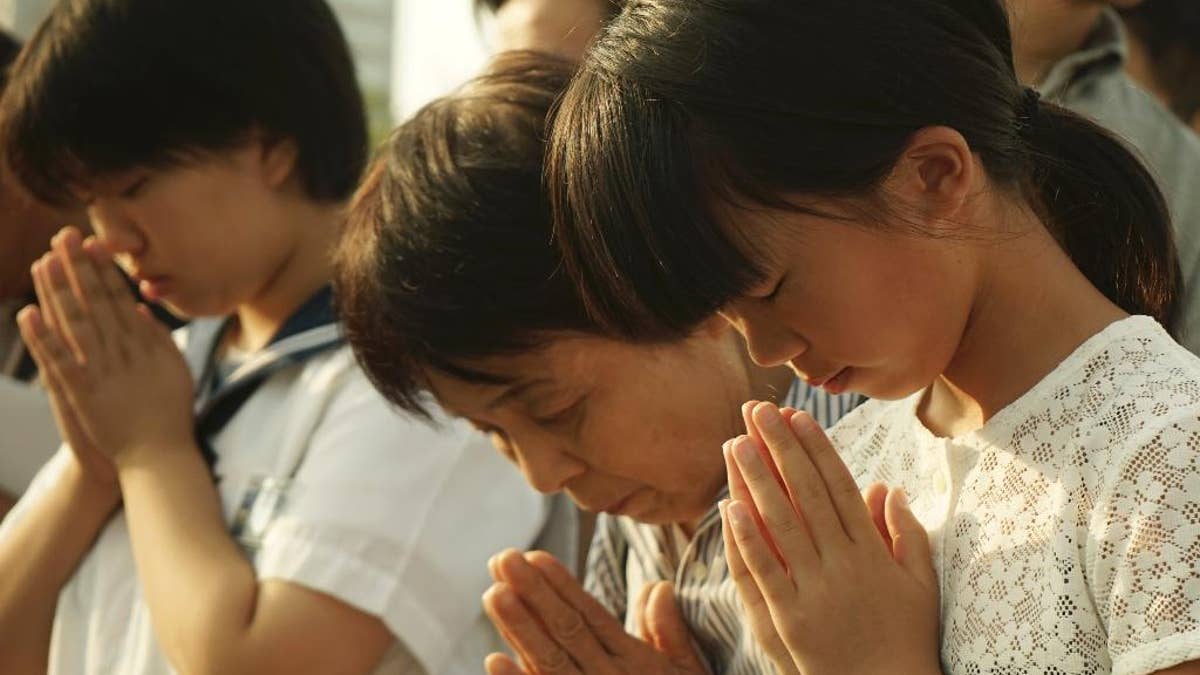
Visitors pray for the atomic bomb victims in front of the cenotaph at the Hiroshima Peace Memorial Park in Hiroshima, western Japan, Thursday, Aug. 6, 2015. Japan marked the 70th anniversary of the atomic bombing on Hiroshima. (AP Photo/Koji Ueda) (The Associated Press)
People of good faith everywhere should welcome the joint visit to Hiroshima’s ground zero by President Obama and Japanese Prime Minister Abe.
Such an event could serve as a powerful symbolic moment of silence and reflection in a world cluttered with mind-numbing and mostly meaningless media and social networking chatter.
Today’s Japan has worked hard to earn our respect and trust as a reliable democratic ally. This visit, in addition to strengthening the U.S.-Japan Alliance should serve to remind all nations of the world, whether friend or foe, the very real consequences of using nuclear weapons.
The dropping of the atomic bomb on Hiroshima was a singular event in the history of humankind and a turning point for our civilization.
It is precisely for these reasons that we should all reflect on the words uttered by President Harry Truman, upon whom rested the ultimate decision to deploy the ultimate weapon of destruction:
“I realize the tragic significance of the atomic bomb… We have used it against those who attacked us without warning at Pearl Harbor, against those who have starved and beaten and executed American prisoners of war, against those who have abandoned all pretense of obeying international laws of warfare. We have used it in order to shorten the agony of war, in order to save the lives of thousands and thousands of young Americans.”
In 2016, some might want to brush past Truman’s perspective. But that would do a terrible disservice to the past and to future generations. The president’s words help explain why Hiroshima happened. The bombings of Hiroshima and Nagasaki and the terrible loss of life and suffering of innocents they unleashed can only be made sense of if Imperial Japan’s culpability in unleashing the prolonged barbarism that characterized WWII in Asia, is made plain.
Further, as our president, Mr. Obama also has a final opportunity to recognize the sacrifices and sufferings of American and allied civilians, soldiers, and POWS.
It was their sacrifice that made possible the defeat of Imperial Japan and set the stage for a democratic Japan to emerge.
Perhaps the president might invite the few remaining living former American POWs to join him and Prime Minister Abe at the Hiroshima ceremony. Their presence combined with the horrific images of the terrible fate suffered by Japanese victims of the atomic bombs, could give citizens on both sides of the Pacific reason to reflect on the causes and horrors of World War II and serve as a powerful reminder to the world that unleashing nuclear weapons after Hiroshima would lead humankind to destruction.
In the Judeo-Christian traditions, memory of past deeds, good and bad, serve as our guideposts for the future.
Let Hiroshima serve as one of those guideposts. Ultimately President Obama’s visit to Hiroshima does not need to seek closure -- only to awaken a world from its moral slumber. When the Peace Bell rings, let it promote historic truth and reconciliation, serve to inspire young Americans and Japanese to remember the victims on both sides and to commit that it ever happens again.
Jan Thompson is president of American Defenders of Bataan & Corregidor Memorial Society. Kinue Tokudome, founder and director of the US-Japan Dialogue on POWs and advisor to the Atomic Heritage Foundation.
